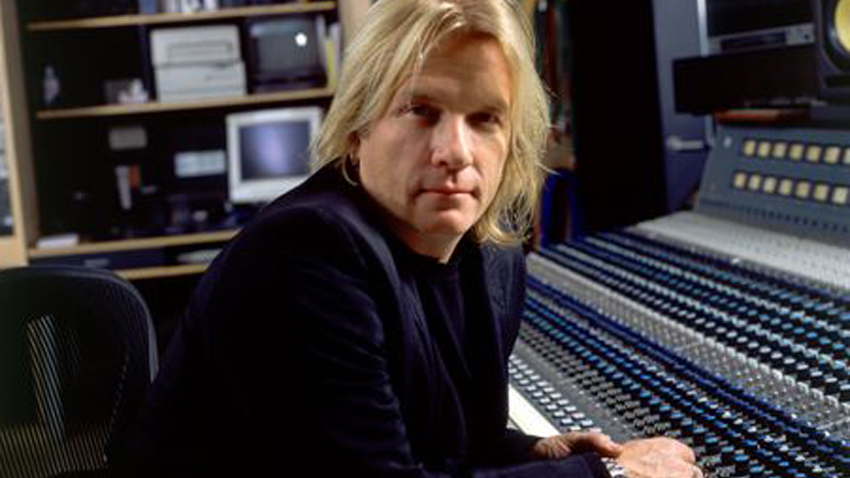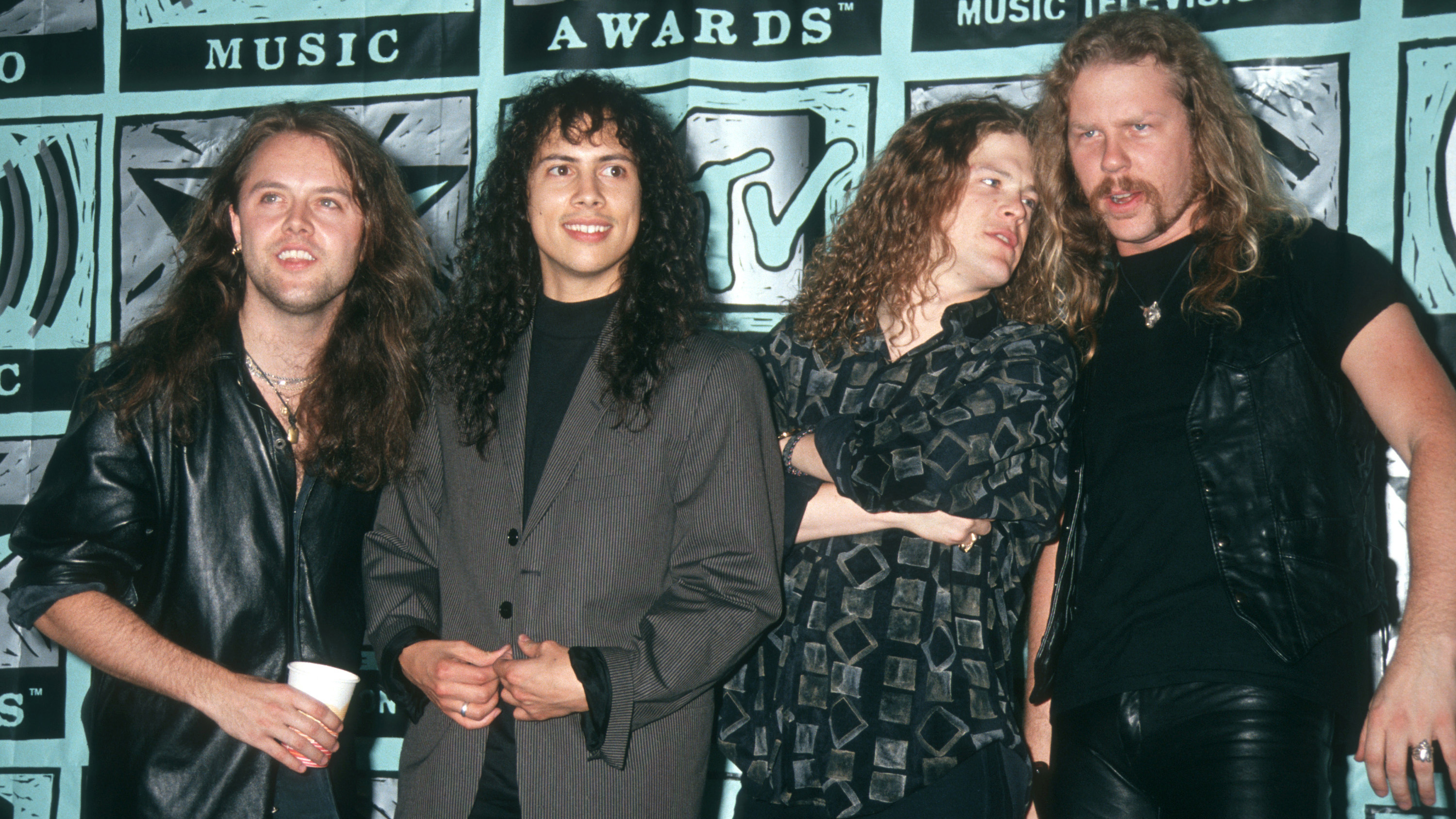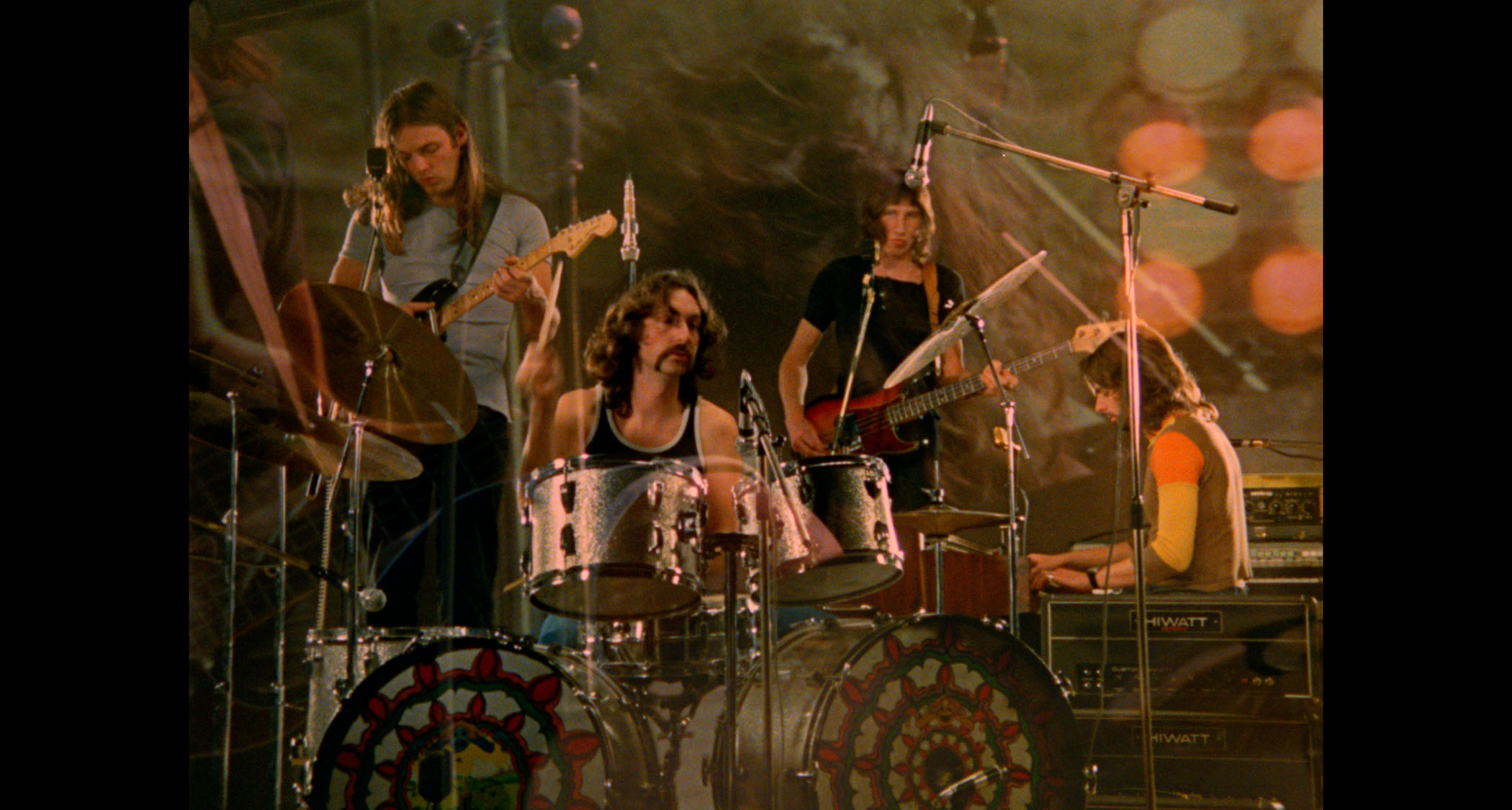
Ten years ago we sat down with Bob Rock to talk through every song on Metallica's phenomenally successful Black Album. As the album hits 30 it feels like the perfect time to revisit the ups and bleak downs that fuelled metal's most commercially successful record.
“It wasn’t a fun, easy record to make,” says producer Bob Rock, speaking of Metallica’s self-titled fifth studio LP, popularly known as the ‘Black Album.’ “Sure, we had some laughs, but things were difficult. I told the guys when we were done that I’d never work with them again. They felt the same way about me.”
When Rock began sessions with Metallica in the fall of 1990, the band (guitarist-singer James Hetfield, drummer Lars Ulrich, guitarist Kirk Hammett and their then-bassist Jason Newsted) had already hit platinum with 1988’s …And Justice For All, which catapulted them from cult stars to arena headliners.

Lars wanted Metallica to groove more
“They had broken through to one level, but they still weren’t on mainstream radio,” says Rock. “When they came to me, they were ready to make that leap to the big, big leagues. A lot of people think that I changed the band. I didn’t. In their heads, they were already changed when I met them.”
Not that Rock didn’t help the group up their game any: Sonically, he gave them a rich, low-end punch that had been lacking in their previous recordings. Part of the process involved addressing Ulrich's drumming. “I noticed that Lars played to James’s guitar,” says Rock, “much like the way that Keith Moon played to Pete Townshend. That’s fine for some bands, but not every one.
“Lars wanted Metallica to groove more. AC/DC’s Back In Black was a big reference point as a rock record that grooved. I told him that in order to get that feel, he had to be the focal point musically. So on certain songs, the band played to Lars. They followed him. It made a real difference.”
Meanwhile, Hetfield was going through an even bigger transition, one which would hold significant ramifications. “He wanted to go deeper with his writing,” says Rock. “He wanted his songs to really matter. We talked about the great songwriters, like Dylan and Lennon and Bob Marley, and I think he saw that he could write for himself but still touch other people. It was a struggle for him, but he had a tremendous breakthrough as a writer.”
Get the MusicRadar Newsletter
Want all the hottest music and gear news, reviews, deals, features and more, direct to your inbox? Sign up here.

It’s probably the biggest accomplishment of my professional life, I think the band would say the same thing
Released on 12 August 1991, the Black Album was immediately hailed as an artistic triumph. Debuting at number one, it spawned the singles Enter Sandman, Sad But True, The Unforgiven, Nothing Else Matters and Wherever I May Roam - songs that would annex radio at multiple formats. Commercially, the album was a colossus, selling a staggering 22 million copies and firmly establishing Metallica as worldwide superstars and an essential part of the cultural landscape.
In this track-by-track Bob Rock (who would eventually work with Metallica again – on five different projects, no less) takes a track-by-track look back at the Black Album. “It’s probably the biggest accomplishment of my professional life,” he says. “I think the band would say the same thing."
Enter Sandman
“I insisted on the band playing live in the studio. They had never done that before – all of their previous records were recorded in sections. I told them, ‘You’re a great live band. That vibe is crucial to the album.’
“On Sandman, I asked Jason to play more like a bass player and less like a guitarist. Put that with the new perspective Lars had on drums and we had a song with a killer groove.
“At first, based on the music and the riff, the band and their management thought it could be the first single. Then they heard James’ lyrics and realised the song was about crib death. That didn’t go over well.
“I sat down with James and talked to him about his words. I told him, ‘What you have is great, but it can be better. Does it have to be so literal?’ Not that I was thinking about the single; I just wanted him to make the song great. It was a process, him learning to say what he wanted but in a more poetic and open sort of way. He rewrote some lyrics and it was all there… the first single.”
Sad But True
The riff was astounding
“They played me the demo, and I told them I thought it was the Kashmir of the ‘90s. The riff was astounding. To my knowledge, they never had anything so heavy, so punchy and powerful. Rhythmically, I could tell it had the potential to be absolutely crushing!
“We were in pre-production, which was uncomfortable because nobody had ever made them go through their songs in such a deliberate way before, and six songs in Sad But True came along. Suddenly, I realized that every song, including this one, was in the key of E.
“I brought this to the band’s attention, and they said, ‘Well, isn’t E the lowest note?’ So I told them that on Motley Crue's Dr Feelgood, which I produced and Metallica loved, the band had tuned down to D. Metallica then tuned down to D, and that’s when the riff really became huge. It was this force that you just couldn’t stop, no matter what.”
Holier Than Thou
It’s got such a lethal bite to it
“The band still teases me about this song because it was the first track that jumped out at me as a potential single. I should point out that at this stage in cutting the record there were no lyrics, so initially, something about the song spoke to me. It rocked in a very aggressive way that said ‘Metallica’ to me.
“As we got deeper into the record, the tide turned and other songs blossomed and became bigger and turned into things like Enter Sandman, whereas Holier Than Thou… great song, not a single.
“I still like its energy and tempo. It’s got such a lethal bite to it. Every time I see the band, they always say the same thing: ‘Holier Than Thou, huh?’ They’ll never let me live it down. What can I say?” [laughs]
The Unforgiven
“James was very enamoured with Chris Isaak’s song Wicked Game. He loved the way the vocal sounded big and warm. At this point, James wanted to sing. He had done a lot of screaming, but now he wanted to go somewhere else.
“In the past, he had always doubled his vocals. He didn’t sing harmonies per se; he just sang the same thing on another track. But the process of doubling doesn’t give you character, really; in fact, a lot of times it takes character away, because you’re hoping that the second vocal gives you the depth that your first vocal should have.
“I told James that we should record his vocal, but instead of listening to himself on headphones I wanted him to listen on speakers. The difference was amazing. He sang the song, and because he heard himself in a different way, there was a whole new dimension to his voice. It was big and deep and warm and jumped out at you.”
Wherever I May Roam
“Realistically, the guys in Metallica can shit out riffs all day, and half of them will be incredible. When you hang out with them, though, you start to hear the difference between a great riff and a Smoke On The Water-type riff. Metallica had several on this album, and I’d say this one is pretty high up there.
I wish I could take credit for the sitar, but it was the band’s idea
“So we started out with a great riff, and then it became my job to help them carry that as a theme throughout the song. There had to be a movement to the parts. Like on other tracks, the big moment in Wherever I May Roam came about when the lyrics were finished. At that point, everything made sense and came together.
“I wish I could take credit for the sitar, but it was the band’s idea. I thought it worked beautifully – a great element to a great song.”
Don't Tread On Me
This one represented my learning the difference between Bon Jovi and Loverboy and the real deal in terms of songwriting
“For me, this was a strange song. The jagged rhythm, kind of a marching feel, which was the whole point, I guess… There was an angry, political slant to Don’t Tread On Me that I had a hard time relating to at first.
“This one represented my learning the difference between Bon Jovi and Loverboy and the real deal in terms of songwriting. Metallica went to a level of depth and passion that I had never encountered before.
“That’s what you get when you come face-to-face with the greats: Even if you aren’t in on what they’re saying, you can tell that they mean it, and in that way, the song makes a connection.”
Through The Never
It took me a while to realise what was good in Through The Never
“It’s funny talking about some of these songs and remembering my learning curve in understanding what Metallica were all about. While I was helping them be the best band they could be, I was gaining so much insight into what made them tick. Each day brought discovery on both sides, theirs and mine.
“It took me a while to realise what was good in Through The Never, but once I did, I realised that it was quite good. And what’s good is there’s a bit of a fiery punk rock vibe to it. A new shade, a new colour - that was exciting!
“Previously, I thought their influences were all metal, but talking to them and understanding that they had other sides to them really opened my eyes. Once I saw where they were coming from, the song made total sense.”
Nothing Else Matters
This is his genius, to be able to say it in his own way and really mean it, despite everything he was going through, all the demons, all the anger he had in him
“I can’t speak for what James wrote, but to me, the song was all about him trying to write a love song without saying the word ‘love.’
“It’s interesting: The man that I knew back then… he could certainly feel love, but he could never say the word, especially in a Metallica song. This is his genius, to be able to say it in his own way and really mean it, despite everything he was going through, all the demons, all the anger he had in him. I think it’s one of Metallica’s best songs ever.
“Musically, we wanted it big but not bombastic. We wanted size and weight, but we didn’t want to do what all the ‘80s metal bands were doing in those kind of cheesy power ballads. We really worked out the arrangement to make it huge and dramatic… but real.”
Of Wolf And Man
I was like, ‘Oh, great, a song about a wolf'
“I’ll be honest: at first I thought it was silly to write about a wolf. I was like, ‘Oh, great, a song about a wolf. What are you fucking getting at? May as well write about pyramids or something.’ When metal goes in these kinds of areas, I lose the plot.
“Then, as we got more into James’s lyrics, I realised that the song wasn’t silly, that there was an earthiness to it. We talked about making the song go through a transformation, kind of reflecting the lyrics. It took a while. I’m not sure if we got there fully, but we got there most of the way.”
The God That Failed
Emotionally, it’s as real as Nothing Else Matters
“That’s the song that really broke the ice between James and me. We had our tensions, but we would talk a lot, and the more I got to know him, the more I realised how much there was to this guy.
“The God That Failed is deep. It’s not just a cheap shot at religion; it’s him tackling the subject in a very complex manner. Emotionally, it’s as real as Nothing Else Matters.
“Working with Kirk on this song was interesting – and this goes for the whole record, too: I was told that he’d come in the last few weeks of making a record to do his guitar solos. I told everybody right off, ‘Well, that’s not how we’re going to do things. He’s going to play live, like everybody else.’
“At first, Kirk was very uncomfortable with this approach, but he was game and played what he thought were guide solos. In many cases, including this one, his first ideas were the ones that we’d go back to and use when doing overdubs. He learned how to be spontaneous."
My Friend Of Misery
“This was pretty much a Jason song. It started out with his intro, so a big part of working on this track was spent developing a great riff into a song that would take flight and really go places. Which it does – it builds and builds quite nicely.
“The song is all about a mood, which is very cinematic in feel. Metallica know how to play to their strengths, dishing out raw power, but on this song we went for more of an atmosphere. It’s ominous, and it works.”
The Struggle Within
The band I got after this record was never the same
“Here, too, I found myself really immersed in something I didn’t fully understand at first. Darkness and all of the emotions that can be attached to it… the subject matter can be very elusive.
“The more and more I plunged into the world of Metallica, the more I came to understand that dealing with tough, scary and not-so-pretty topics were things they were driven to explore.
“The band I got after this record was never the same, but I guess that’s to be expected. They grew up. They became men, father and husbands. Being in Metallica was still vitally important to them, but when we did the Black Album, it was the only thing to them. I got them at just the right time.”
Metallica (The Black Album) Remastered will be available as a Deluxe Box Set and numerous other editions and formats on 10 September. For more info visit Metallica.
Production legend Bob Rock on 16 career-defining records
Joe is a freelance journalist who has, over the past few decades, interviewed hundreds of guitarists for Guitar World, Guitar Player, MusicRadar and Classic Rock. He is also a former editor of Guitar World, contributing writer for Guitar Aficionado and VP of A&R for Island Records. He’s an enthusiastic guitarist, but he’s nowhere near the likes of the people he interviews. Surprisingly, his skills are more suited to the drums. If you need a drummer for your Beatles tribute band, look him up.
"At first the tension was unbelievable. Johnny was really cold, Dee Dee was OK but Joey was a sweetheart": The story of the Ramones' recording of Baby I Love You
"Reggae is more freeform than the blues. But more important, reggae is for everyone": Bob Marley and the Wailers' Catch a Fire, track-by-track










